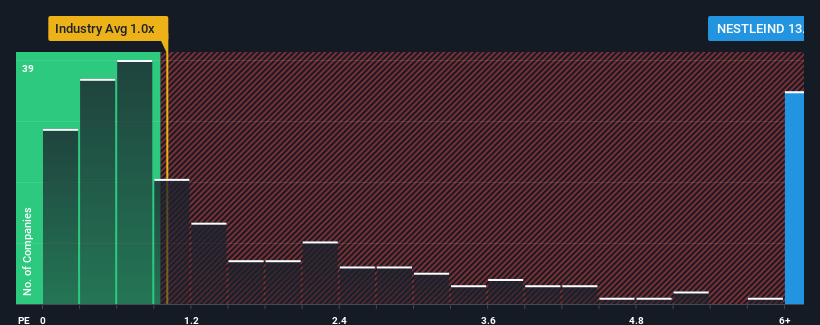What You Can Learn From Nestlé India Limited's (NSE:NESTLEIND) P/S

Nestlé India Limited's (NSE:NESTLEIND) price-to-sales (or "P/S") ratio of 13.2x may look like a poor investment opportunity when you consider close to half the companies in the Food industry in India have P/S ratios below 1x. Although, it's not wise to just take the P/S at face value as there may be an explanation why it's so lofty.
Check out our latest analysis for Nestlé India

What Does Nestlé India's P/S Mean For Shareholders?
Recent times have been advantageous for Nestlé India as its revenues have been rising faster than most other companies. It seems the market expects this form will continue into the future, hence the elevated P/S ratio. You'd really hope so, otherwise you're paying a pretty hefty price for no particular reason.
Want the full picture on analyst estimates for the company? Then our free report on Nestlé India will help you uncover what's on the horizon.How Is Nestlé India's Revenue Growth Trending?
There's an inherent assumption that a company should far outperform the industry for P/S ratios like Nestlé India's to be considered reasonable.
Retrospectively, the last year delivered a decent 13% gain to the company's revenues. Pleasingly, revenue has also lifted 44% in aggregate from three years ago, partly thanks to the last 12 months of growth. Accordingly, shareholders would have definitely welcomed those medium-term rates of revenue growth.
Looking ahead now, revenue is anticipated to climb by 16% during the coming year according to the seven analysts following the company. With the industry only predicted to deliver 12%, the company is positioned for a stronger revenue result.
With this information, we can see why Nestlé India is trading at such a high P/S compared to the industry. It seems most investors are expecting this strong future growth and are willing to pay more for the stock.
The Bottom Line On Nestlé India's P/S
Typically, we'd caution against reading too much into price-to-sales ratios when settling on investment decisions, though it can reveal plenty about what other market participants think about the company.
We've established that Nestlé India maintains its high P/S on the strength of its forecasted revenue growth being higher than the the rest of the Food industry, as expected. Right now shareholders are comfortable with the P/S as they are quite confident future revenues aren't under threat. Unless the analysts have really missed the mark, these strong revenue forecasts should keep the share price buoyant.
You need to take note of risks, for example - Nestlé India has 2 warning signs (and 1 which shouldn't be ignored) we think you should know about.
If you're unsure about the strength of Nestlé India's business, why not explore our interactive list of stocks with solid business fundamentals for some other companies you may have missed.
Valuation is complex, but we're here to simplify it.
Discover if Nestlé India might be undervalued or overvalued with our detailed analysis, featuring fair value estimates, potential risks, dividends, insider trades, and its financial condition.
Access Free AnalysisHave feedback on this article? Concerned about the content? Get in touch with us directly. Alternatively, email editorial-team (at) simplywallst.com.
This article by Simply Wall St is general in nature. We provide commentary based on historical data and analyst forecasts only using an unbiased methodology and our articles are not intended to be financial advice. It does not constitute a recommendation to buy or sell any stock, and does not take account of your objectives, or your financial situation. We aim to bring you long-term focused analysis driven by fundamental data. Note that our analysis may not factor in the latest price-sensitive company announcements or qualitative material. Simply Wall St has no position in any stocks mentioned.
About NSEI:NESTLEIND
Nestlé India
Manufactures and sells food products in India and internationally.
Adequate balance sheet average dividend payer.

